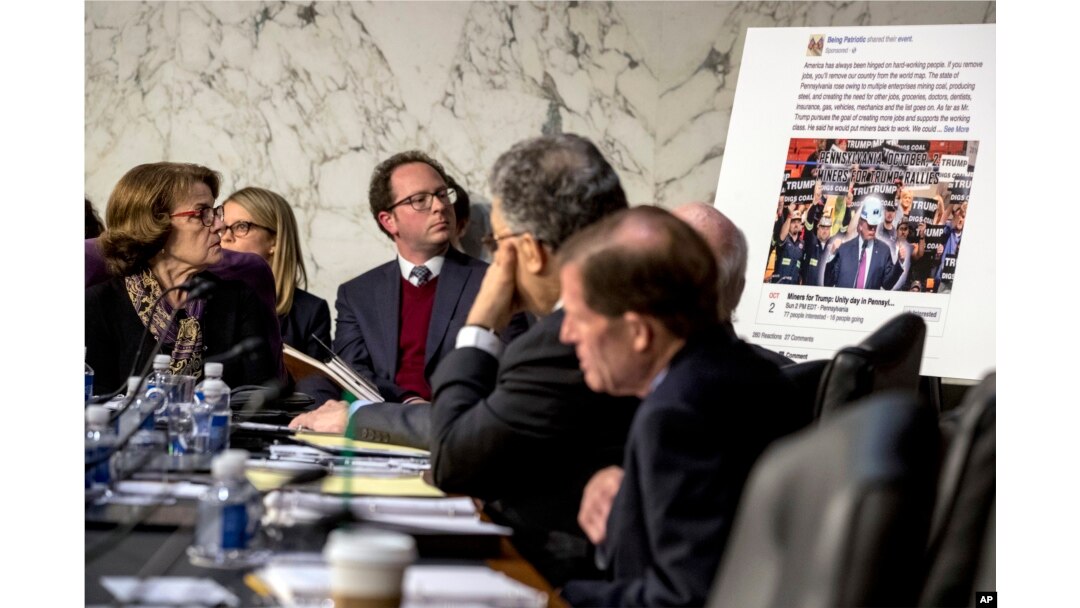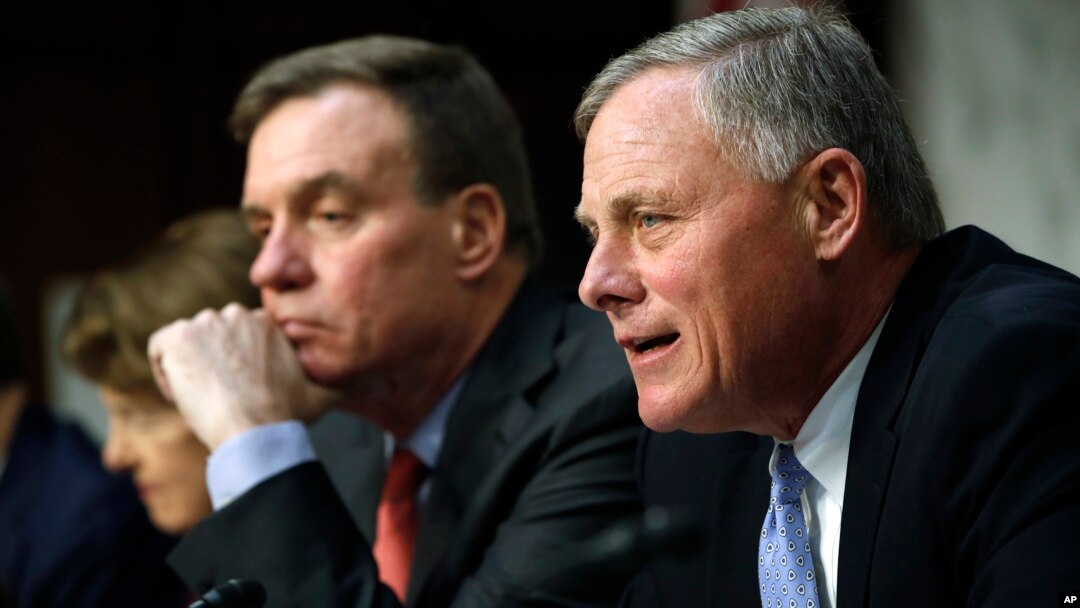Tempers flared as U.S. lawmakers grilled Facebook, Twitter and Google representatives about Russia's use of their platforms to spread disinformation during the 2016 presidential campaign, as well as the companies' efforts to prevent a repeat.
"You must do better to protect the American people and, frankly, all of your users from this kind of manipulation," Senate Intelligence Committee Chairman Richard Burr, a Republican from North Carolina, told attorneys for the tech giants at a hearing on Wednesday.
WATCH: Social Media Companies Face Tough Congressional Questions on Russian Election Interference
Your browser doesn’t support HTML5
Social Media Companies Face Tough Congressional Questions on Russian Election Interference
"I don't think you get it," Senator Dianne Feinstein, a Democrat from California, said. "What we're talking about is a cataclysmic change. … What we're talking about is a major foreign power with the sophistication and ability to involve themselves in a [U.S.] presidential election and sow conflict and discord all over this nation."
Feinstein stressed that social media companies bear ultimate responsibility for the material that gets posted on their sites.
"You've created these platforms, and now they are being misused. And you have to be the ones to do something about it -- or we [Congress] will," she said.

Democratic Sen. Dianne Feinstein, left, and several Senate colleagues look at a poster depicting an example of a misleading internet ad as representatives of Facebook, Twitter and Google testify during hearing on Capitol Hill in Washington, Oct. 31, 2017.
Democrats on the House Intelligence Committee released a sampling of content that Facebook, Instagram and Twitter had identified as being linked to Russian actors. The content -- ads, videos and tweets -- covered a range of topics, including race, immigration, Islam, state pride and LGBT issues.
Phony accounts
Facebook, Twitter and Google have acknowledged that entities traced to Russia used phony accounts and other tactics to spread inflammatory messages and fake advertising that reached millions of Americans in 2015 and 2016. Lawyers for the companies stressed they take the problem seriously and are aggressively combating it.
"All of these [phony foreign] accounts and pages violated our policies, and we removed them," Facebook General Counsel Colin Stretch said.
As part of the House Permanent Select Committee on Intelligence’s open hearing with social media companies on Wednesday, the HPSCI Minority entered into the record as exhibits a representative sampling of advertisements and other content that Facebook, including Instagram, and Twitter have tied to Russian actors and turned over to the committee. Here is an example.
"Going forward, we are making significant investments. We're hiring more ad reviewers, doubling or more our security engineering efforts, putting in place tighter ad content restrictions, launching new tools to improve ad transparency, and requiring documentation from political ad buyers," he said.
Stretch added that fake ads "were a very small fraction of the overall content on Facebook, but any amount is too much."
Holding social media companies to account continued on the other side of the Capitol hours later, when the House Select Committee on Intelligence held a hearing on the same topic, with the same witnesses.
From left, Facebook's General Counsel Colin Stretch, Twitter's Acting General Counsel Sean Edgett, and Google's Senior Vice President and General Counsel Kent Walker, are sworn in for a Senate Intelligence Committee hearing on Russian election activity and technology, Nov. 1, 2017, on Capitol Hill in Washington.
"All three companies have a public responsibility to ensure that the content carried on your platforms is not produced by foreign adversaries seeking to harm our society and our democratic process," Representative Mike Conaway, a Texas Republican, said.
Republicans on the Senate committee zeroed in on data from social media platforms showing Russia's disinformation campaign predated the Republican Party's nomination of Donald Trump last year, suggesting Moscow's overarching aim was to undermine American democracy, not to elect Trump as president.
"This is a whole lot broader than simply the 2016 election," Senator James Risch, a Republican from Idaho, said.
Burr said, "I'm here to tell you, this story does not simplify that easily."
As part of the House Permanent Select Committee on Intelligence’s open hearing with social media companies on Wednesday, the HPSCI Minority entered into the record as exhibits a representative sampling of advertisements and other content that Facebook, including Instagram, and Twitter have tied to Russian actors and turned over to the committee. Here is an example.
The witnesses concurred.
"The large majority of the material we saw was socially divisive rather than direct electoral advocacy," Google general counsel Kent Walker said.
At the House hearing, Democrats challenged that assertion.
"The Russians mounted what could be described as an independent expenditure campaign on Mr. Trump's behalf," said Representative Adam Schiff, a California Democrat. "Russian ads on Twitter, for example, promoted stories about [Democratic presidential nominee] Hillary Clinton's allegedly poor health or legal problems."
Facebook ads linked to a Russian effort to disrupt the American political process are displayed at a House Intelligence Committee hearing on Capitol Hill in Washington, Nov. 1, 2017.
Democrats also accused tech giants of being slow to recognize and combat the threat from abroad.
Senator Mark Warner, a Virginia Democrat, said the committee's concerns, stretching back to the beginning of the year, "were, frankly, blown off by the leaderships of your companies."
"Candidly, your companies know more about Americans, in many ways, than the United States government does. And the idea that you had no idea that any of this [foreign influence campaign] was happening strains my credibility," Warner added.
Twitter's acting general counsel, Sean Edgett, said the company has taken action against suspected Russian trolls, suspending 2,752 accounts. Similar efforts were announced by Facebook and Google, the parent company of YouTube.
Both the House and Senate intelligence committees are conducting yearlong probes of Russia's election meddling, with reports expected from both at a future date.
Meanwhile, bipartisan legislation has been introduced in the Senate that would compel web-based sites to verify and make public the sources of political advertising, just as U.S. broadcasters must do.
VOA's Joshua Fatzick contributed to this report.


